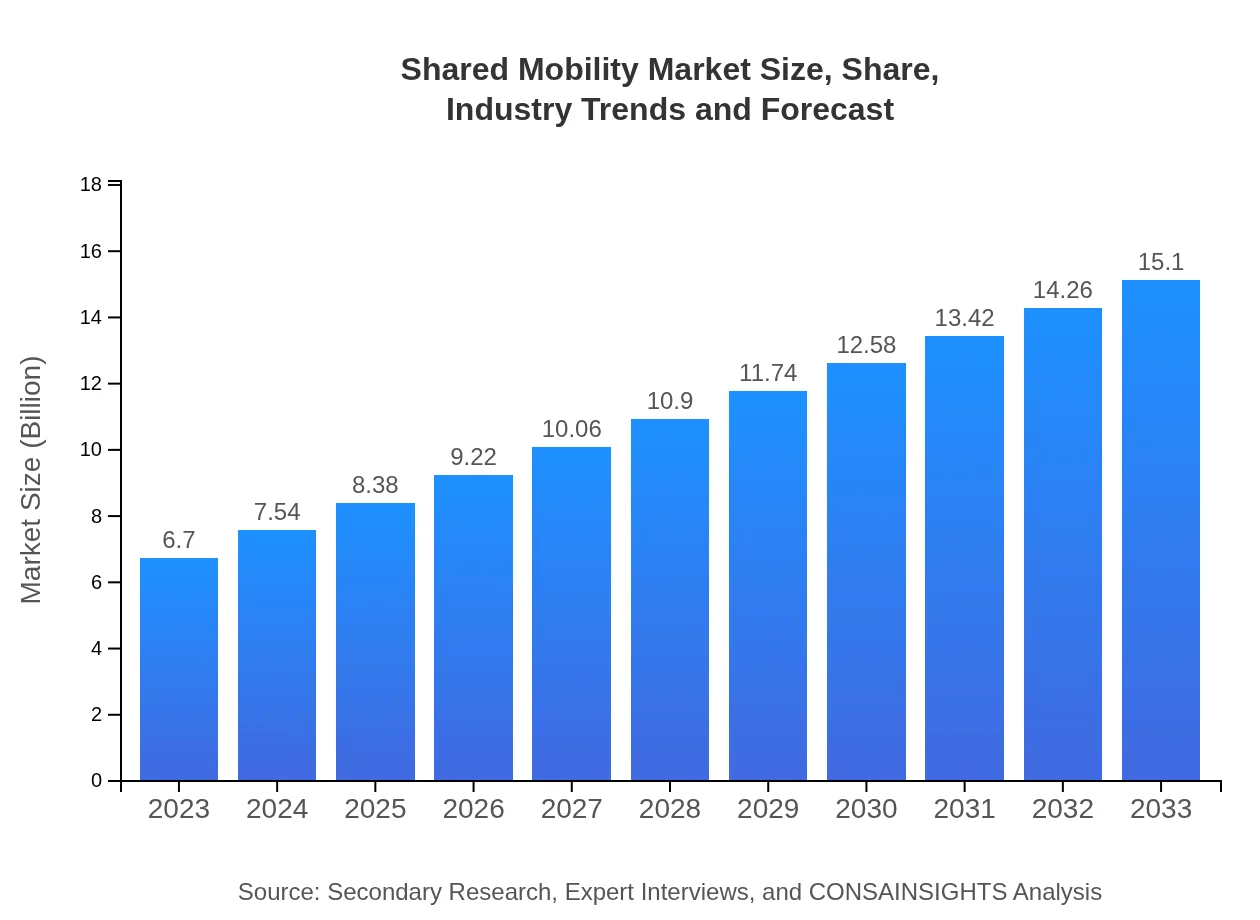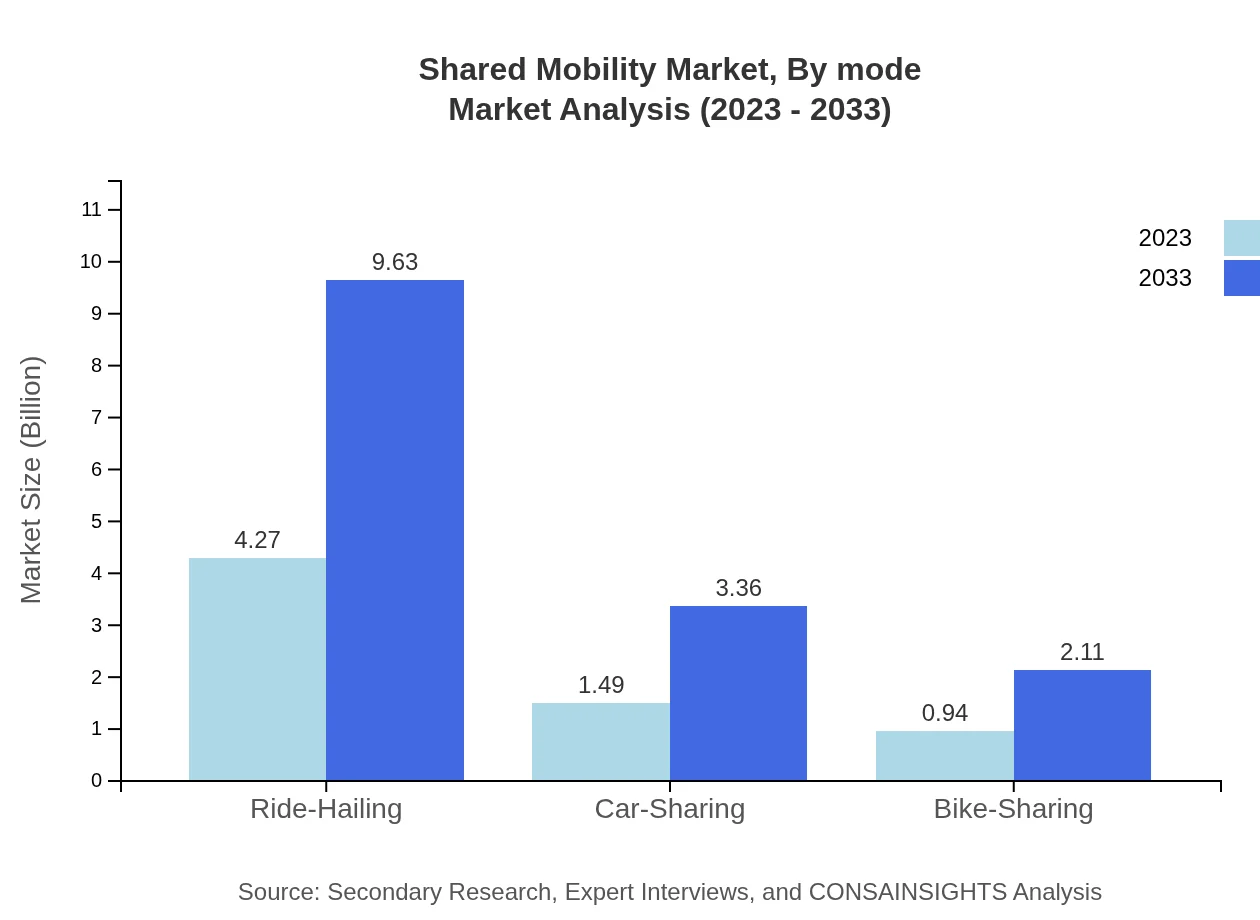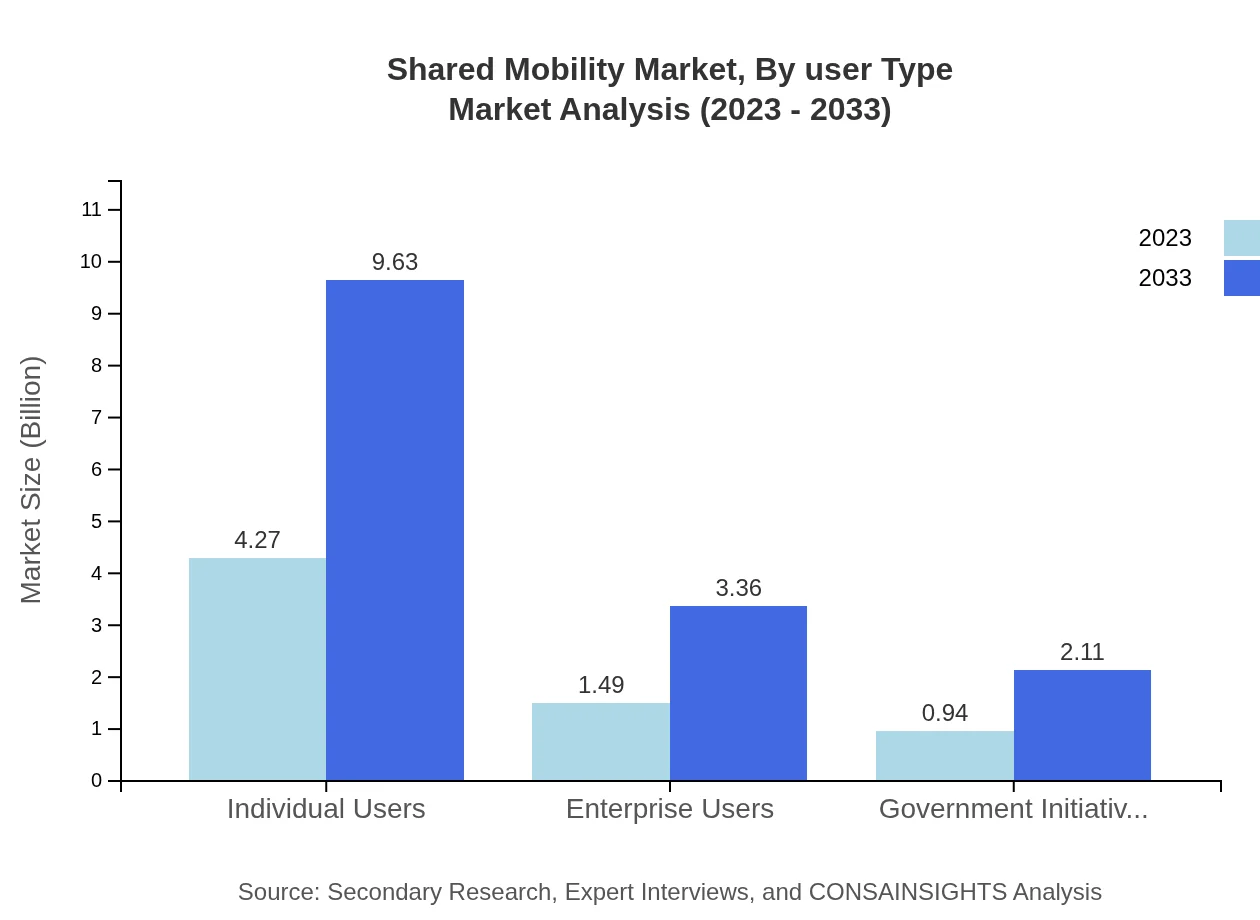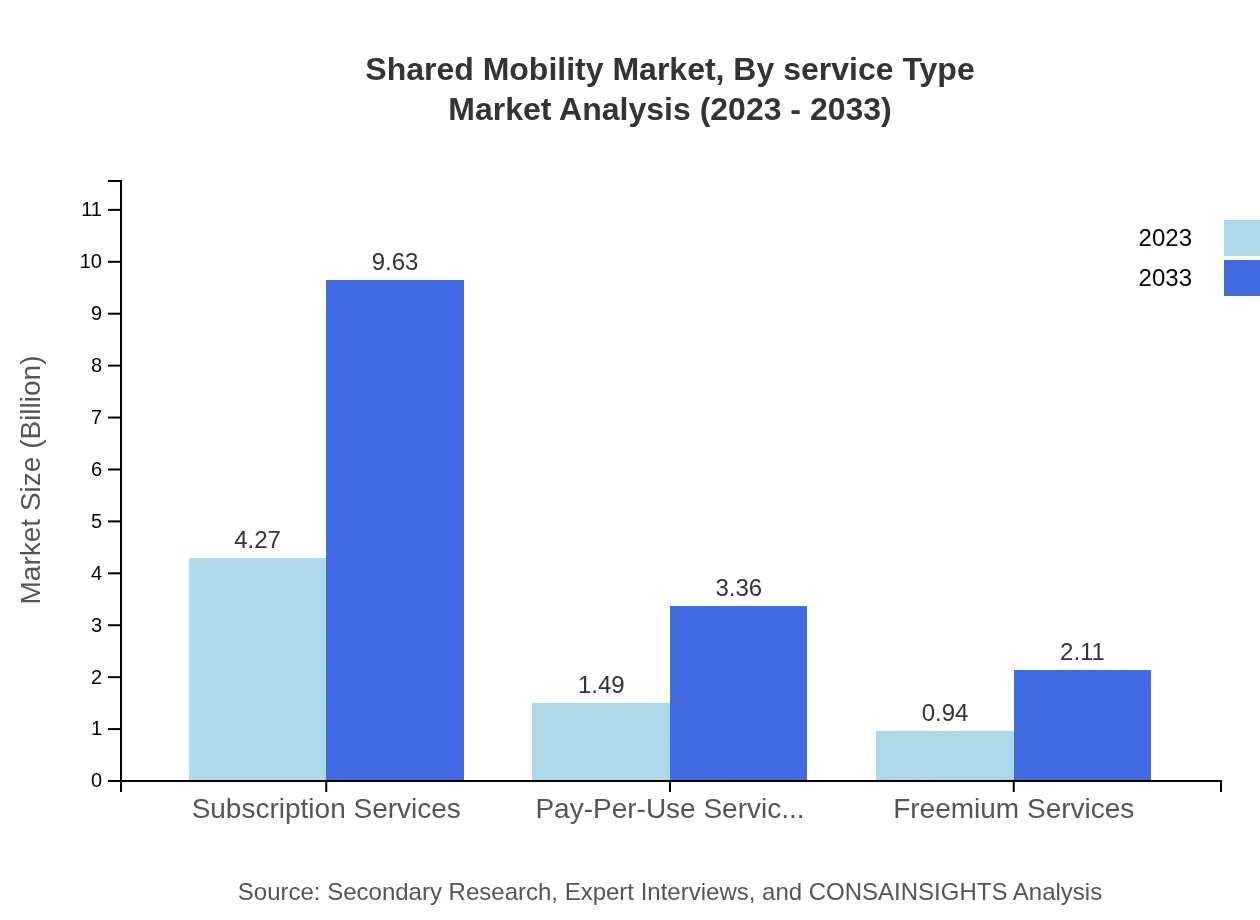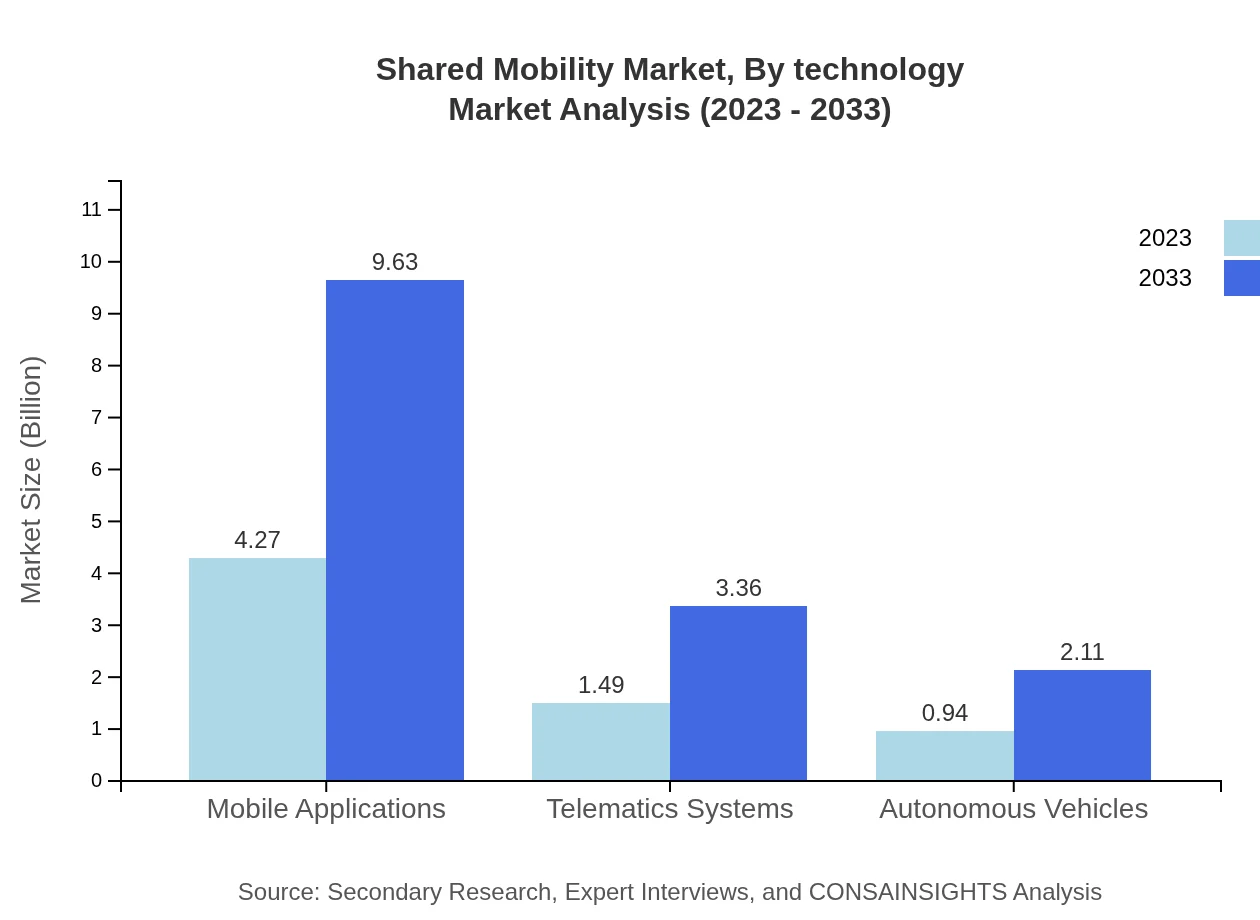Shared Mobility
Published Date: 02 February 2026 | Report Code: shared-mobility
Shared Mobility Market Size, Share, Industry Trends and Forecast to 2033
This report provides a comprehensive analysis of the Shared Mobility market, including insights on trends, segment performance, regional dynamics, and forecasts through 2033. It is designed to inform stakeholders about the future landscape of shared transportation services.
| Metric | Value |
|---|---|
| Study Period | 2023 - 2033 |
| 2023 Market Size | $6.70 Billion |
| CAGR (2023-2033) | 8.2% |
| 2033 Market Size | $15.10 Billion |
| Top Companies | Uber Technologies, Inc., Lyft, Inc., Daimler AG, BlaBlaCar, Grab Holdings |
| Last Modified Date | 02 February 2026 |
Shared Mobility Market Overview
Customize Shared Mobility market research report
- ✔ Get in-depth analysis of Shared Mobility market size, growth, and forecasts.
- ✔ Understand Shared Mobility's regional dynamics and industry-specific trends.
- ✔ Identify potential applications, end-user demand, and growth segments in Shared Mobility
What is the Market Size & CAGR of Shared Mobility market in 2023?
Shared Mobility Industry Analysis
Shared Mobility Market Segmentation and Scope
Tell us your focus area and get a customized research report.
Shared Mobility Market Analysis Report by Region
Europe Shared Mobility:
Europe's Shared Mobility market is forecasted to expand from $2.16 billion in 2023 to $4.86 billion by 2033. The continent's commitment to sustainability and smart city initiatives is shifting consumer preferences towards shared solutions, driven by increasing urbanization and technological adoption.Asia Pacific Shared Mobility:
The Asia Pacific region shows significant growth potential in the Shared Mobility market, with a projected market size of $2.87 billion by 2033, growing from $1.27 billion in 2023. Major cities are increasingly adopting shared services to combat traffic congestion and pollution. Government initiatives supporting urban mobility solutions further enhance prospects.North America Shared Mobility:
North America is projected to lead the Shared Mobility market with an expected size of $5.13 billion by 2033, up from $2.28 billion in 2023. The region benefits from a favorable regulatory environment, high consumer adoption rates, and leading companies that continuously innovate to enhance service offerings.South America Shared Mobility:
In South America, the Shared Mobility market is expected to grow from $0.41 billion in 2023 to $0.93 billion by 2033. Urban areas, particularly in Brazil and Argentina, are seeing increased acceptance of ride-sharing and bike-sharing models as solutions to mobility challenges, underpinned by a growing middle-class population and smartphone penetration.Middle East & Africa Shared Mobility:
The Middle East and Africa region is expected to increase its market size from $0.58 billion in 2023 to $1.32 billion by 2033. Investments in smart city projects and a youthful demographic eager for technology-enabled mobility solutions are key drivers for the region's growth.Tell us your focus area and get a customized research report.
Shared Mobility Market Analysis By Mode
Ride-hailing services dominate the Shared Mobility sector, projected to reach $9.63 billion by 2033 from $4.27 billion in 2023. Car-sharing is also significant, anticipated to grow to $3.36 billion. Bike-sharing, while smaller, is gaining traction including a rise to $2.11 billion in the coming years, catering to eco-conscious consumers.
Shared Mobility Market Analysis By User Type
The demand from individual users remains the largest, accounting for a substantial market share of 63.73% in both 2023 and 2033. Enterprise user adoption is growing steadily, focusing on fleet solutions and cost efficiencies, making up 22.27% of the market.
Shared Mobility Market Analysis By Service Type
Subscription services are taking precedence in the Shared Mobility sector, indicating a trend toward long-term engagement and customer retention. They constitute 63.73% of the market. Pay-per-use services appeal to price-sensitive consumers, maintaining a strong market presence as reflected in their 22.27% share.
Shared Mobility Market Analysis By Technology
Technology plays a pivotal role in the growth of Shared Mobility, with mobile applications at the forefront, representing 63.73% of service deployment. Innovations such as telematics systems and autonomous vehicles are influential, improving operational efficiency and enhancing user experiences.
Shared Mobility Market Trends and Future Forecast
Tell us your focus area and get a customized research report.
Global Market Leaders and Top Companies in Shared Mobility Industry
Uber Technologies, Inc.:
Uber is a pioneer in the ride-hailing market, providing innovative solutions for urban mobility through its technology-driven platform, which connects users with drivers conveniently.Lyft, Inc.:
Lyft offers ride-sharing services primarily in North America, focusing on providing a sustainable transportation option by partnering with electric vehicle manufacturers and promoting efficient ride-sharing.Daimler AG:
Daimler is involved in car-sharing services through its Car2Go platform, emphasizing the integration of transportation models and sustainability measures in urban centers.BlaBlaCar:
BlaBlaCar operates long-distance carpooling services, leveraging social networking features to connect drivers with passengers and reduce transportation costs while promoting environmental sustainability.Grab Holdings:
Grab provides a multi-service platform including ride-hailing, food delivery, and digital payments, strongly establishing itself in Southeast Asia'sShared Mobility ecosystem.We're grateful to work with incredible clients.









FAQs
What is the market size of shared mobility?
The global shared mobility market is currently valued at approximately $6.7 billion, with a projected CAGR of 8.2% from 2023 to 2033. This growth is driven by increasing urbanization and a shift towards sustainable transportation solutions.
What are the key market players or companies in this shared mobility industry?
Key players in the shared mobility industry include ride-hailing giants like Uber and Lyft, car-sharing platforms such as Zipcar and Turo, and bike-sharing companies like Lime and Ofo. Additionally, various tech and automotive companies are investing in shared mobility services in collaboration.
What are the primary factors driving the growth in the shared mobility industry?
Major growth drivers in the shared mobility industry include increasing urbanization, rising congestion in cities, the growing popularity of sustainability among consumers, advances in mobile technology, and supportive government policies promoting shared transportation solutions.
Which region is the fastest Growing in the shared mobility?
North America is the fastest-growing region in the shared mobility market, projected to increase from $2.28 billion in 2023 to $5.13 billion by 2033. Europe and Asia-Pacific also exhibit significant growth potential, enhancing global market dynamics.
Does ConsaInsights provide customized market report data for the shared mobility industry?
Yes, ConsaInsights offers customized market report data tailored to specific client needs in the shared mobility sector. These tailored reports can include in-depth analysis, regional insights, and competitive assessments to support strategic decision-making.
What deliverables can I expect from this shared mobility market research project?
Deliverables from the shared mobility market research project include a comprehensive market report, segmentation analysis, competitive landscape insights, regional market dynamics, and actionable recommendations to leverage market opportunities effectively.
What are the market trends of shared mobility?
Current trends in the shared mobility market include increased adoption of electric and autonomous vehicles, the growth of digital platforms for seamless ride-sharing experiences, integration of smart city technologies, and the promotion of environmentally-friendly transportation alternatives.

